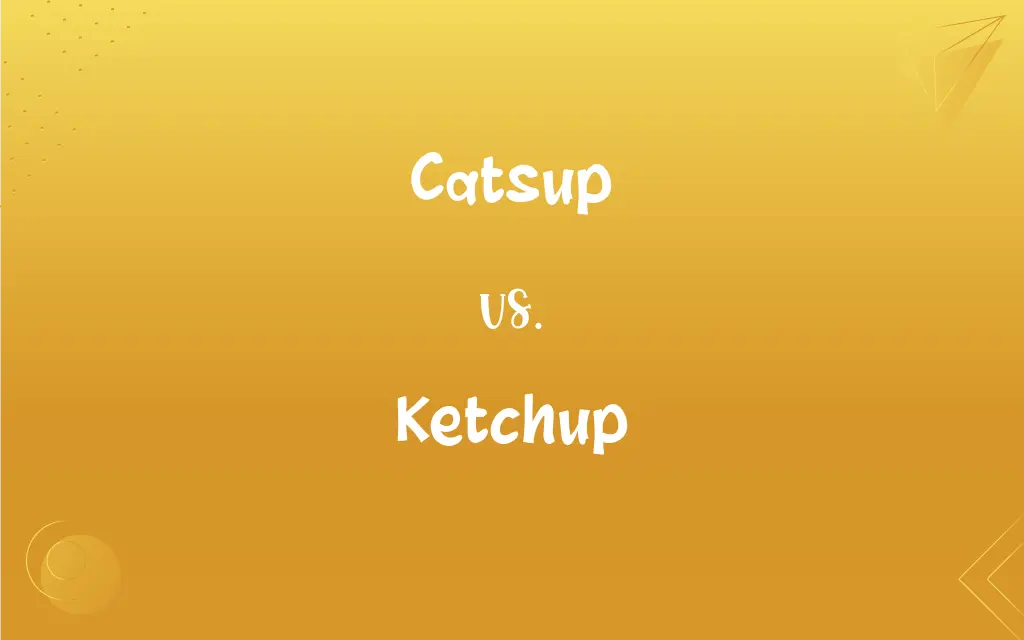Catsup vs. Ketchup: What's the Difference?
Edited by Aimie Carlson || By Janet White || Updated on October 7, 2023
"Catsup" and "Ketchup" both refer to a tomato-based condiment, with "Ketchup" being the more commonly used term in modern American English.

Key Differences
"Catsup" and "Ketchup" are two terms that reference the same popular tomato-based condiment. However, their usage and acceptance differ based on historical and regional contexts.
"Ketchup" is the spelling that has won favor in American English and is the term you'll most likely encounter on supermarket shelves and restaurant menus in the United States. It's synonymous with the tangy, sweet sauce that accompanies fries, burgers, and more.
Conversely, "Catsup" is an older term that has largely fallen out of popular usage but was once prevalent. This variation traces back to historical attempts at Anglicizing foreign terms for similar sauces.
Both words have origins from Asian languages, signifying a brined fish sauce. Their transformation to a tomato-based condiment is a testament to cultural exchange and adaptation.
In today's context, while "Ketchup" reigns supreme in popular nomenclature, "Catsup" remains a nod to the condiment's varied linguistic and culinary journey.
ADVERTISEMENT
Comparison Chart
Modern Usage
Less common
Predominant in American English
Historical Relevance
Older variation of the term
Evolved as the preferred spelling
Linguistic Origin
Linked to earlier attempts at Anglicizing foreign terms
More standardized and accepted in contemporary language
Product Labeling
Rarely seen on products today
Commonly found on product labels
Regional Preference
Was once common in certain parts of the U.S.
Universally accepted in the U.S.
ADVERTISEMENT
Catsup and Ketchup Definitions
Catsup
An older term for a tomato-based condiment.
He found a bottle of catsup in his grandmother's pantry.
Ketchup
A sauce made of tomatoes, vinegar, sugar, and spices.
Ketchup is a staple in most American households.
Catsup
A historically common term for tomato sauce in the U.S.
Some older restaurants still have catsup listed on their menus.
Ketchup
A versatile condiment in Western cuisines.
She mixed ketchup with mayo to make a dip.
Catsup
A sauce made primarily from tomatoes, vinegar, and spices.
He spread catsup over his scrambled eggs.
Ketchup
A tomato-based condiment used widely in cuisines.
He poured ketchup over his fries.
Catsup
A condiment used to enhance the flavor of various dishes.
She added catsup to her burger for extra zest.
Ketchup
The preferred American term for a tomato sauce.
The ketchup bottle was nearly empty.
Catsup
A variation of the word "ketchup."
The recipe called for catsup, but she used ketchup instead.
Ketchup
A tangy, sweet sauce accompanying many dishes.
No hotdog is complete without mustard and ketchup.
Catsup
Variant of ketchup.
Ketchup
A condiment consisting of a thick, smooth-textured, spicy sauce usually made from tomatoes.
Catsup
Alternative form of ketchup
Ketchup
(uncountable) A tomato-vinegar-based sauce, sometimes containing spices, onion or garlic, and (especially in the US) sweeteners.
Tomato ketchup
This diner serves ketchup in red bottles, and mustard in yellow ones.
Catsup
Same as Catchup, and Ketchup.
Ketchup
Such a sauce more generally (not necessarily based on tomatoes, but with mushrooms, fish, etc.).
Catsup
Thick spicy sauce made from tomatoes
Ketchup
(transitive) To cover with ketchup.
Ketchup
A pureed table sauce made predominantly from tomatoes, flavored with onions, sugar, salt and spices; called also tomato ketchup. The term is also applied to pureed sauces containing mushrooms, walnuts, etc., being called in such cases mushroom ketchup, walnut ketchup, etc.
Ketchup
Thick spicy sauce made from tomatoes
FAQs
Is one term more correct than the other?
"Ketchup" is more commonly accepted in modern American English.
Was "Catsup" ever the dominant term?
Yes, in certain periods and regions, "Catsup" was more commonly used.
Are "Catsup" and "Ketchup" the same thing?
Yes, they both refer to the same tomato-based condiment.
Why are there two different terms?
Both evolved from attempts to Anglicize foreign terms for similar sauces.
Is "Catsup" still used today?
While less common, "Catsup" can still be found in some older contexts.
Are the ingredients different for "Catsup" and "Ketchup"?
No, the ingredients are generally the same for both.
Why is "Ketchup" more popular now?
Branding, product labeling, and regional preferences have made "Ketchup" the preferred term.
Can I use "Catsup" in recipes?
Yes, "Catsup" and "Ketchup" can be used interchangeably in recipes.
How did the tomato-based condiment get its name?
Both terms have origins from Asian languages, denoting a brined fish sauce.
Are there differences in taste?
The taste primarily depends on the brand and recipe, not the term used.
Is there a difference in spelling between American and British English?
"Ketchup" is standard in both, but British English might also use "tomato sauce" for similar products.
Why do some older people still use "Catsup"?
Historical product labeling and regional preferences influenced their terminology.
Is "Catsup" used outside the U.S.?
"Ketchup" is more universally recognized, but "Catsup" might be found in older references.
How did "Ketchup" become the dominant term?
Branding and regional preferences played a significant role.
Can I find "Catsup" in supermarkets today?
It's rarer, but some retro or niche brands might use the term "Catsup."
About Author
Written by
Janet WhiteJanet White has been an esteemed writer and blogger for Difference Wiki. Holding a Master's degree in Science and Medical Journalism from the prestigious Boston University, she has consistently demonstrated her expertise and passion for her field. When she's not immersed in her work, Janet relishes her time exercising, delving into a good book, and cherishing moments with friends and family.
Edited by
Aimie CarlsonAimie Carlson, holding a master's degree in English literature, is a fervent English language enthusiast. She lends her writing talents to Difference Wiki, a prominent website that specializes in comparisons, offering readers insightful analyses that both captivate and inform.































































